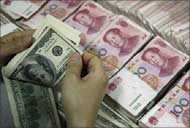Taxing the banks for future bailouts is only a "compromise formula", as a section of G-20 members, including India, is against any such levy, Finance Minister Pranab Mukherjee has said.
 "That was the compromise formula, because a section of the meeting that felt that there is no need of having any taxation as such," Mukherjee told PTI in an interview.
"That was the compromise formula, because a section of the meeting that felt that there is no need of having any taxation as such," Mukherjee told PTI in an interview.
He was referring to the Busan G-20 communique earlier this month where it was proposed that financial institutions contribute towards governments' measures to spur economies.
"If there are well placed regulations that can take care of this problem ... the health of the banks can be protected," Mukherjee said when asked if this issue would again be discussed in the G-20 Summit in Toronto on June 26-27.
Striking a different tone, French President Nicolas Sarkozy and German Chancellor Angela Merkel have joined forces in seeking consensus on a bank tax levy.
In a joint letter addressed to the summit host, Canadian Prime Minister Stephen Harper, Sarkozy and Merkel argued taxing bank on financial transactions was necessary to ensure "a fair contribution" from them towards sharing any burdens associated with government interventions in future financial crisis.
While acknowledging the G-20 nations' efforts towards implementing financial reforms in the backdrop of global financial crisis, they said recent financial troubles had indicated more action was needed to ensure financial stability.
"We must keep up the momentum in implementing our agenda and continue to address the new challenges in a coordinated manner", they said in the letter, copies of which were sent to 17 members of the G-20 including Prime Minister Manmohan Singh, who will attend the summit.
Asked what role he sees for India in G-20, Mukherjee said, "India has been a great stabilising force and it is the second fastest growing economy. Secondly, we have taken initiative for the reform of international financial institutions."
"We are urging for the greater voice and percentage share of the emerging economies, which has been recognised by the enhanced capital increase in the World Bank and the International Monetary Fund," he said.
The World Bank in April announced shifting of 3 per cent voting power in favour of developing countries, bringing their total stake to 47 per cent in the multi-lateral agency. India became the seventh largest shareholder in the World Bank following this shift.
Finance ministers and central bank governors of the 20 developed and developing countries met in South Korea on June 4-5 to find ways for the recovery of the global economy.
Taking forward the finance ministers meeting, leaders of the 20 nations would meet in Toronto and would also discuss on reforming the regulation of the financial sector.










 © 2025 Rediff.com -
© 2025 Rediff.com -